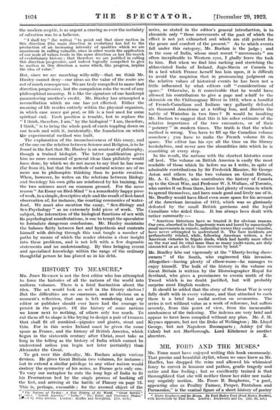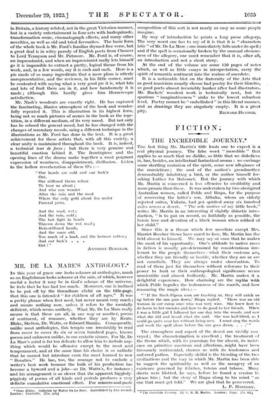MR. FORD AND THE MUSES.*
MR. FORD must have enjoyed writing this book enormously. That precise and beautiful stylist, whom we once knew as Mr. Hueffer, has dropped the reins and allowed his whimsical fancy to curvet in humour and pathos, gentle tragedy and satire and fine fooling ; but so excellently trained is that thoroughbred that she will neither throw her rider nor make any ungainly motion. Mr. Poore B. Bosphorus, " a poet, appearing also as Poultry Farmer, Pauper, Pantaloon and Parnassian," is the central figure of a short history of poetry " Mister Bosphorus and Ms Muses. By Ford Mados Ford (Ford Madox Hueffer), with dccoratioils by Paul Nash. London : Duckworth and Co. [lbs. Cd. net.]
in Britain, a history related, not in the great Victorian manner, but in a variety entertainment in four acts with harlequinade, transformation scene, cinematograph effects, and many other novelties, as well as old and tried favourites. The basic form of the whole book is Mr. Ford's familiar rhymed free verse, but a great deal is in witty parody of English poets from Chaucer to Lord Tennyson and Mr. Patmore. Mr. Ford is, of course, an impressionist, and when an impressionist really lets himself go it is impossible to extract a pretty, logical theme from his work, and, in a few words, say it is such and such. Here is a pie made of so many ingredients that a mere plum is utterly unrepresentative, and the reviewer, in his little corner, must be contented with saying what a very good pie it is, what lots and lots of fruit there are in it, and how handsomely it is made ; although this hardly gives him Horneresque satisfaction.
Mr. Nash's woodcuts are exactly right. He has captured the fascinating, illusive atmosphere of the book and wonder- fully repeated it. This is illustration in its highest form, being not so much pictures of scenes in the book as the repe- tition, in a different medium, of its very mood. But not only has he echoed the general mood, but he has changed with the changes of secondary moods, using a different technique in the illustrations as Mr. Ford has done in the text. It is a great achievement for these artists that, with all this variety, a clear unity is maintained throughout the book. It is, indeed, a technical tour de force ; but there is very genuine and beautiful emotion behind it. The frontispiece and the opening lines of the drama make together a most poignant expression of weariness, disappointment, disillusion. Listen to the hollow reverberation of these O's
" Our hands are cold and our luck's Out, Our stiffened thews refuse To bear us about ; And who can wonder After the rain and the road Where the only gold about lies under Funeral yews.
And the road, wet ; And the rain, cold ; The last light in bands Thrown down the wet road ; Rein-stiffened . hands, And the mare old, Too much of a load, and the harness rotten ; And our luck's . . .
Out !"
ANTHONY BERTRAM.



































 Previous page
Previous page